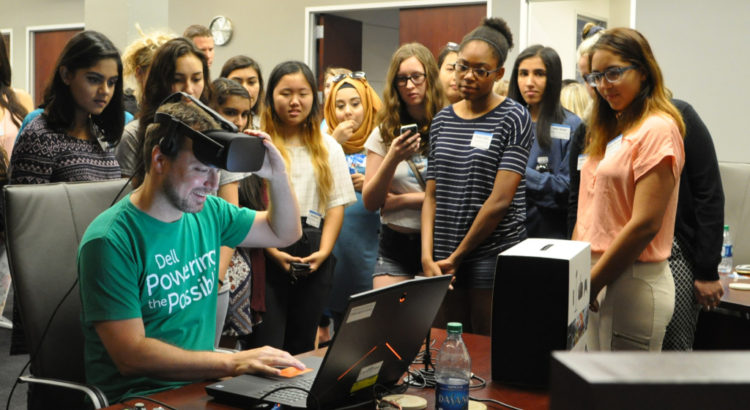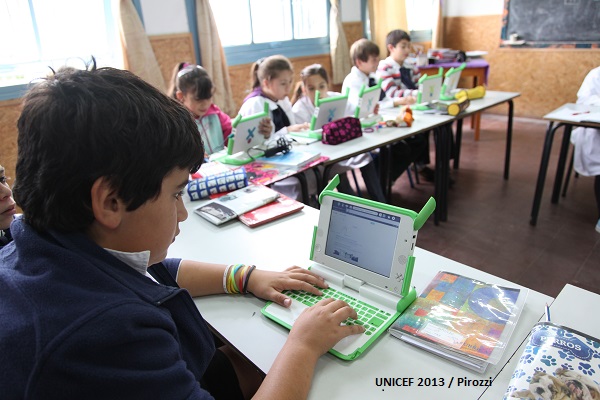15 octubre 2016/Fuente: redem
Durante miles de años, los seres humanos adquirimos la información necesaria para relacionarnos con el entorno físico y con los demás, a través de la experiencia directa. La mayor parte de la información llegaba, lentamente, después de observar fenómenos y situaciones con nuestros propios ojos. El cerebro era alimentado también por relatos e informaciones procedentes de las experiencias vividas por otras personas, que trasladaban de forma verbal lo que habían visto con sus ojos, o escuchado con sus oídos. La transmisión de la información se realizaba de forma oral, con todas las ventajas e inconvenientes que esto supone, y de una forma evidentemente muy limitada y condicionada, fácil de alterar y sometida a la degeneración del mensaje propia del boca a boca.
Hace aproximadamente 5.000 años, con la creación de la escritura y la lectura, se produce una auténtica revolución en nuestro cerebro. Para adaptarse a la lectura, el cerebro tuvo que reorganizarse, permitiendo el desarrollo de largas y cada vez más complejas argumentaciones, acompañadas de multitud de datos que no era necesario memorizar en su totalidad, y dando lugar a pensamientos mucho más reflexivos. La lectura puso en marcha todo un proceso de desarrollo creativo. La imaginación y las investigaciones de unos, permitieron que otros continuaran creando hasta convertir en realidad muchas de las cosas que hoy nos rodean.
Pero, incluso este fabuloso cambio tuvo sus detractores y enemigos. Así es, nada menos que Sócrates, personaje sobre el que habría mucho que decir, consideraba que la escritura traería más problemas que beneficios. Afirmaba que la dependencia de la letra escrita alteraría para peor la mente de las personas. Defendía que la escritura amenazaba con convertirnos en pensadores menos profundos intelectualmente, menos sabios y menos felices. Nada menos… Por suerte y con el paso del tiempo se fueron imponiendo los argumentos defendidos por Platón, que veía en la escritura una oportunidad, aunque durante los primeros siglos estuviera reservada sólo a una minoría privilegiada.

El segundo cambio importante se produciría con la adopción de la lectura silenciosa. Así es, durante siglos la lectura fue algo practicado por unos pocos y siempre en voz alta, con el objetivo de transmitir. Entorno al año 380, San Agustín se sorprende al ver a San Ambrosio leer sin abrir la boca ni emitir sonido alguno… La lectura en silencio, para el propio lector, trajo consigo todo un mundo de reflexiones, variedad y diversidad en las interpretaciones y autoconciencia. Permitía pararse, debatir consigo mismo sobre lo leído, releer, etc.
El tercer cambio se produjo entre los siglos XII y XIII, con la aparición y generalización en el uso de las palabras y los signos de puntuación. En efecto, durante siglos y siglos los manuscritos estuvieron formados por tediosos encadenamientos de letras, sin espacios que permitieran separar las palabras o detenerse ante puntos o comas. El lector debía realizar ímprobos esfuerzos por interpretar finalmente el contenido y sentido de las letras encadenadas que acababa de leer.
El cuarto cambio supuso una verdadera revolución, así como la popularización de la escritura, la lectura e incluso la cultura y el pensamiento en todas sus formas. A mediados del siglo XV, el orfebre alemán Johannes Gutemberg inventa la imprenta. Los escasos y artesanales libros dan paso a la edición y distribución de miles de ejemplares por toda Europa. Obras antes apenas leídas comenzaron a estar al alcance de los ciudadanos del momento. Los precios y los tiempos de edición se redujeron enormemente, y la demanda de libros se disparó. Según los cálculos realizados por Michael Clapham en “Printing”, en los cincuenta años posteriores a la invención de la imprenta, se editaron tantos libros como los reproducidos por los escribas europeos a lo largo de los mil años precedentes. A finales del siglo XV más de 250 ciudades europeas tenían ya imprenta, y circulaban más de 12 millones de libros. Pero este maravilloso invento también tuvo sus detractores… Muchos comenzaron a preguntarse si era bueno que todo el mundo pudiera tener acceso a la información… Y no digamos ya si se trataba de información, contenidos u opiniones que podían no ser compartidos por el poder imperante en el momento. Según señala Joad Raymond en “The Invention of the Newspaper: English Newbooks”, el primer censor oficial de libros que hubo en Inglaterra planteó que la tipografía estaba trayendo más daño que beneficio a la cristiandad. Pero, como todos sabemos, la imprenta no sólo no cesó de imprimir libros, sino que gracias a ella la Biblia es el libro más difundido del mundo..
Y, finalmente, el quinto cambio también debe ser considerado una revolución: la escritura y lectura digitales a través de internet. La web 2.0 ha convertido además a las personas en productoras de información, y no sólo en meras consumidoras. Blogs, redes sociales, webs temáticas, foros, etc, etc, están permitiendo que cualquier ser humano con una conexión a internet pueda comunicar algo al resto del mundo con posibilidad de ser accesible para unos 2.500 millones de usuarios. Según los datos publicados por Science en el año 2011, la humanidad actual genera cada 2 días la misma información generada por nuestra especie durante casi 5.000 años. Es decir, 5 Exabytes de información cada 48 horas.
El acceso a la información hoy en día es digital: menos del 0’1% de la información generada en la actualidad está en papel. El 99,9% de la información se encuentra disponible sólo en formato digital. Cada minuto que pasa se realizan 2 millones de consultas en Google. Es decir, el buscador es el principal y omnipresente medio de búsqueda de información para niños, adolescentes y adultos.
Y he aquí que, tal y como señalan investigadores y neurocientíficos de todo el mundo, la forma en que adquirimos la información influye en nuestra forma de percibirla y de transmitirla. El tipo de actividad mental que desarrollamos configura nuestro cerebro y la distribución de las neuronas. Tenemos la suerte de estar dotados de una herramienta extremadamente sensible, con una fabulosa característica que conocemos como NEUROPLASTICIDAD. El cerebro se modifica a sí mismo. No es estático ni rígido. Las neuronas establecen nuevos caminos, ponen en marcha nuevos circuitos neuronales y abandonan otros que quedan obsoletos. Algunas neuronas son descartadas, pero otras muchas pasan a engrosar y reforzar los nuevos caminos. La economía del reciclaje manda en el cerebro.
Pues bien, la herramienta que utilizamos para leer y para escribir nos condiciona. Sea la que sea… El propio Nietzsche afirmaba que desde que había comenzado a escribir con una máquina de escribir, no sólo su prosa sino incluso sus pensamientos se habían visto condicionados. El paso del papel a la máquina supusieron pare él un cambio importante. No podía ni imaginar lo que supondría más tarde el paso al cibertexto…
¿ES DISTINTO LEER INFORMACIÓN EN LIBROS A LEERLA EN PÁGINAS WEB?
Pues sí. Los estudios que lo ponen de manifiesto son muchos y muy variados. Uno de ellos es el realizado por el Dr. Jakob Nielsen, Director del Grupo Nielsen Norman que cofundó con el Dr. Donald A. Norman (ex vicepresidente de investigación de Apple Computer). Tras la realización de un estudio de seguimiento ocular, concluye que los usuarios de internet no realizan una lectura lineal, sino que “escanean” la pantalla. Los usuarios realizan una “lectura en F”. Leen las dos primeras líneas, y bajando por la izquierda vuelven a detenerse en el centro. Después abandonaban de nuevo la lectura lineal y bajan hacia la parte inferior izquierda. Las mismas conclusiones han sido obtenidas por otras entidades como el Laboratorio de Investigación de Usabilidad de Software de la Universidad Estatal de Wichita.
Según las investigaciones de Jakob Nielsen, las personas realmente leen menos del 20% del contenido de una página web. Así mismo, concluye que muchos usuarios dedican hasta un 69% de su atención al lado izquierdo de la pantalla, y sólo el 30% a la parte derecha.
Un estudio realizado entre jóvenes de 12 a 18 años por el University College of London, dirigido por el Profesor David Nicholas, determinó que los adolescentes necesitan mucho menos tiempo para encontrar una información en internet que los adultos. Son seis veces más rápidos que sus mayores. Pero, del mismo modo, el estudio concluye que internet disminuye la capacidad de concentración, así como la capacidad de los jóvenes para leer y escribir textos largos.
La empresa israelí de software ClikTale, recogió durante dos meses datos del comportamiento de un millón de visitantes de páginas web. Averiguó que en la mayoría de los países los usuarios de internet sólo pasan entre 19 y 27 segundos en cada web que visitan. Nunca leen una página entera.
Los estudios realizados por Ziming Liu, Catedrático de Biblioteconomía de la Universidad Estatal de San José, indican que está surgiendo un comportamiento lector basado en la pantalla, en el que la lectura se realiza en forma de exploración, de manera aleatoria, ni lineal ni fija y centrada en la búsqueda de palabras clave.
La psicóloga del desarrollo Patricia Greenfield, profesora en la Universidad de UCLA, repasó en 2009 más de cincuenta estudios sobre los efectos de los medios de comunicación en la inteligencia de las personas y su capacidad de aprendizaje. La conclusión fue la siguiente: el creciente uso de la Red está debilitando nuestras capacidades para el “procesamiento profundo” que permite “la adquisición consciente del conocimiento, el análisis inductivo, el pensamiento crítico, la imaginación y la reflexión”.
La verdad es que después de leer tantos artículos e investigaciones, no es difícil quedarse con la idea de que la lectura en internet está desestabilizando nuestros cerebros, hasta el punto de que puede llegar a producirse una involución. No obstante, creo que debemos ser mucho más objetivos, y situar cada cuestión en su contexto antes de sacar una conclusión.
¿LA LECTURA EN INTERNET ES COMPATIBLE CON LA LECTURA LINEAL DE LIBROS?
Creo que esta es la verdadera cuestión. Personalmente, como muchos de ustedes, pongo en práctica lo que considero son dos formas de lectura muy distintas, utilizadas siempre en función de las circunstancias. Leo, o “escaneo”, cientos de páginas web todos los días. Pero lo hago para buscar e identificar informaciones concretas. Sin esta forma de lectura, tan desarrollada por los adolescentes de hoy, tardaríamos muchas horas en determinar si la información contenida en una web responde a lo que estamos buscando o no. Es cierto que con la práctica se puede descartar un contenido en pocos segundos. La lectura en “F” me parece muy lógica. Leemos los encabezados y las primeras líneas para determinar si nos interesa, y después bajamos por la izquierda porque es donde empiezan los párrafos tras un punto y aparte. ¡Pero no hacemos esto sólo en internet! Lo hacemos también cuando hojeamos un libro de una estantería para saber si puede interesarnos, o cuando pasamos las páginas de una revista, o incluso cuando aun leemos algún periódico en papel.
Y lo cierto es que no he dejado de leer libros. Y no los “escaneo”, sino que realizo una lectura lineal, reflexiva y en profundidad, como hacemos todos cuando leemos un libro o un artículo que nos interesa (aunque sea tan largo como este). Creo, sinceramente, que ambas formas de lectura responden a necesidades distintas y son absolutamente compatibles y NECESARIAS.
EL HECHO DE QUE DOS FORMAS DE LECTURA PUEDAN CONVIVIR, NO QUIERE DECIR QUE VAYAN A HACERLO…
En efecto, esta es la siguiente cuestión que debemos plantearnos. Personalmente, como seguramente usted mismo/a, he pasado los primeros 30 años de mi vida leyendo libros, de forma lineal y reflexiva. Durante todo ese tiempo se han asentado en nuestros cerebros toda una serie de estructuras y circuitos neuronales, la mayoría de los cuales permanecen. No me inicié con la lectura en internet, ni he tenido que compaginar la lectura “tradicional” con la lectura “digital” hasta hace pocos años. La verdad es que no debemos asumir que los niños adoptarán ambas formas de lectura sin problemas, y sabiendo diferenciar perfectamente entre una y otra. Y no debemos asumirlo porque sabemos cómo funciona nuestro cerebro…:
-
Nuestro cerebro es un ahorrador nato. De hecho, siendo tan pequeño consume el 20% de toda la energía que utiliza nuestro organismo. Parte de su trabajo consiste en optimizar recursos y ser “sostenible”. Si puede hacer algo de una forma más sencilla y que suponga menos esfuerzo LO HARÁ. Leer siempre de la misma manera es más fácil que tener que cambiar de registro y hacerlo de dos formas distintas en función de las circunstancias. Si una forma de lectura se realiza mucho más que la otra, el cerebro reforzará los procesos asociados para que cada vez nos resulte más fácil y sencillo leer así. En definitiva, la afianzará.
-
No nos engañemos, la lectura de una página web o un contenido online bien diseñado resulta mucho más atractiva, en especial para los más pequeños. La mezcla de colores, fotografías, imágenes en movimiento, vídeos, banners, enlaces a otros sitios, etc, satisfacen la constante e innata curiosidad de nuestro cerebro. Muchos y muy diversos estímulos pueden tenerlo entretenido disfrutando con cada nuevo impacto, con cada nuevo descubrimiento, pero sin permitirle finalmente centrar su atención y profundizar dejando a un lado las distracciones.
CONCLUSION
Sinceramente, creo que existe el riesgo de que en los más pequeños, que no tienen años de experiencia en la lectura lineal y reflexiva, terminen adoptando y afianzando una forma de lectura en “escaneo”, que no permite profundizar en los contenidos, con una necesidad constante de cambiar de tarea para recibir nuevos estímulos, y muy dada a la distracción.
Y a tenor de los resultados señalados en el último informe PISA, lo último que necesitamos es que la comprensión lectora de los niños y adolescentes sea aun peor.
Pero NO podemos tampoco convertirnos en los Sócrates de nuestro tiempo, ni en los censores que desconfiaban de los nuevos inventos. La lectura en “F” es necesaria y fundamental ante la cantidad ingente de información que circula por internet. Es una adaptación a un nuevo entorno que no podemos ni debemos perder. Es más, debe entrenarse. Los niños y adolescentes están ya realizando ese entrenamiento. Pero hoy, más que nunca, es necesario reforzar la lectura lineal y reflexiva que permite PROFUNDIZAR, ASIMILAR y AFIANZAR información, datos y conceptos. Esto también debe entrenarse. Más que antes, sin lugar a dudas.
Obliguemos a nuestro cerebro a esforzarse. Puede hacerlo (¡y en el fondo le gusta!). Es vital que los niños y adolescentes de hoy lean libros enteros, profundicen y reflexionen sin distracciones. Nos jugamos más de lo que pensamos. En este momento, que los niños lean libros debe ser una prioridad para padres/madres y educadores. Debe ser una prioridad para toda la sociedad.
Fuente noticia: http://www.redem.org/internet-esta-modificando-la-forma-de-leer-y-procesar-la-informacion-de-ninos-y-adolescentes/
Fuente imagen: http://www.gob.mx/cms/uploads/article/main_image/17394/Unicef_-_700.jp














 Users Today : 94
Users Today : 94 Total Users : 35459560
Total Users : 35459560 Views Today : 149
Views Today : 149 Total views : 3417907
Total views : 3417907